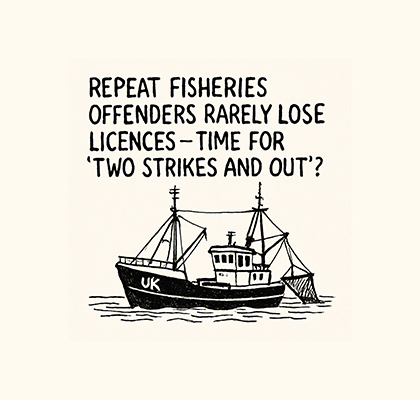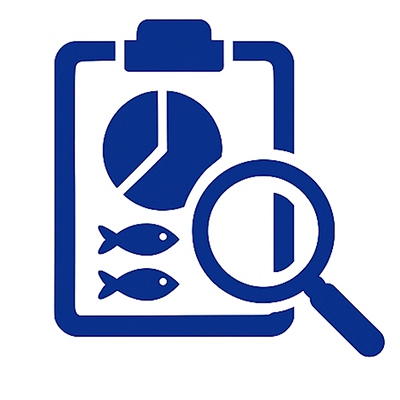Introduction: Illegal fishing practices threaten the UK’s marine life and undermine honest fishers and anglers. Yet despite repeat offences, it’s virtually unheard of for English commercial fishers to lose their licences. This article explores why repeat fisheries offenders in England rarely (if ever) face licence revocation, focusing on the inherited EU penalty points system and real-world cases of serial violators in shellfisheries. We’ll see how current rules allow habitual offenders to keep fishing – and why UK recreational anglers and conservationists are urging a tougher “two strikes and out” policy.
The Current System: Lots of Points, Little Pain
England (like the rest of the UK) adopted an EU-designed penalty points system for serious fisheries offences in 2014 (gov.uk). Under this system, each conviction for a “serious infringement” adds points to the vessel’s fishing licence. In theory, accumulating enough points leads to licence suspension or revocation. In practice, however, the bar is set extremely high: a licence is suspended only after 18+ points (e.g. a two-month ban for 18 points, four months at 36, etc.), and only when 90 points are reached – effectively five separate serious convictions – can the licence be permanently withdrawn (theoutlawocean.com). This makes a permanent licence loss a distant, almost academic prospect.
Crucially, points are only applied once offenders are convicted in court, and even then enforcement has been lax. A review of enforcement data revealed that between 2010 and 2014, penalty points were recorded only once (in a Scottish case) and none in England (clientearth.org). Even as of 2017, the Marine Management Organisation (MMO) – England’s fisheries regulator – had no record of any licence points being applied, suggesting the system was essentially unused (clientearth.org). In other words, while the law provides for suspending or cancelling licences, in reality repeat violators almost never accumulate enough points to be forced out of the industry.
Why isn’t the points scheme hitting its mark? Partly because many offences aren’t officially deemed “serious” enough to trigger points, and partly because authorities often opt for fines or warnings rather than piling on points (clientearth.org). The end result is that even habitual rule-breakers continue fishing with their licences intact, so long as they pay their fines. This stands in stark contrast to other regulatory regimes (like driving licences) where multiple infractions quickly lead to suspension.
Post-Brexit Status: Same Rules, Same Results
One might wonder if Brexit changed this enforcement approach. The short answer is no – the points system remains in place post-Brexit. The UK carried over the EU’s Common Fisheries Policy control measures into domestic law, including the licence points scheme (gov.uk). In January 2021, the guidance on applying points for serious infringements was updated with essentially the same thresholds and provisions as the EU regulation (theoutlawocean.com). No significant reform or strengthening of sanctions has occurred under the 2020 Fisheries Act framework, meaning the high thresholds for suspensions and revocations still apply.
If anything, Brexit has thrown a spotlight on enforcement gaps. UK authorities must now stand on their own in deterring illegal fishing, yet there’s little evidence of a crackdown on repeat offenders. The MMO and Inshore Fisheries and Conservation Authorities (IFCAs) continue to primarily use fines (or administrative penalties) as punishment, rather than invoking the nuclear option of licence suspension. No public reports to date show an English vessel licence being permanently revoked for reaching 90 points, and it appears unlikely any boat has even come close. For all intents and purposes, the “points on your licence” approach remains a paper tiger in England’s post-Brexit fisheries management.
Meanwhile, other parts of the UK are experimenting with tougher measures at a local level. In Shetland, for example, the local Shellfish Management Organisation introduced Scotland’s first ban on landing egg-bearing (“berried”) lobsters in 2022 – and breaching it can get a vessel’s shellfish licence suspended for up to 8 weeks on the first offense (shetlandtimes.co.uk). This locally driven rule (ironically pushed by fishermen themselves) shows a far more immediate deterrent: one strike and you’re benched for two months. It’s a stark contrast to the national system where a first serious offence might only yield a fine and some points, with no actual fishing downtime.
Shellfish Scofflaws: Repeat Offenders in Lobster and Crab Fisheries
Some of the most egregious repeat offenders have been caught in shellfish fisheries – targeting high-value species like lobsters and crabs in ways that blatantly flout conservation laws. These cases underscore how lenient penalties allow offenders to keep fishing. Consider these publicly reported examples:
-
Rowse Fishing Ltd (Cornwall) – A family-owned firm (trading as the Real Cornish Crab Company) has been caught twice in recent years for illegal shellfishing. In January 2023, Rowse Fishing Ltd and skipper Ben Rowse pleaded guilty to landing protected lobsters – including berried (egg-carrying) females and lobsters with tell-tale mutilated tails (indicating v-notches or eggs were deliberately removed)(fishingnews.co.uk). Inspectors found multiple berried lobsters on their vessel Emma Louise and even discovered lobster eggs on deck brushes – evidence that crew had “scrubbed” eggs off females to hide the offence (fishingnews.co.uk). The company was fined £20,000 (plus £6,300 costs) and the skipper ~£2,500 (fishingnews.co.uk). Despite this hefty fine, the same firm offended again within two years. In April 2024, the Emma Louise was found landing undersized crabs and lobsters with eggs illegally removed; the owners (Mark and Emma Rowse) ended up in court once more in 2025 (fisherynation.com). Cornwall Live noted it was “the second time” the company’s owners had been caught catching undersized shellfish and scrubbing eggs from females, wiping out unborn stock and threatening future lobster populations (web-cdn.bsky.app). Yet even after repeated convictions, their fishing licence was not stripped – they simply paid another round of fines and carry on business as usual.
-
Three Jays Shellfish (Cornwall) – This Newquay-based operation run by Michael “Ian” Jepson was caught twice in one year taking berried lobsters. In May 2022, Cornwall IFCA officers inspecting Jepson’s vessel found seven female lobsters carrying eggs; several had abraded tail undersides, consistent with eggs having been forcibly scrubbed off (itv.com). While that investigation was ongoing, the same boat was boarded in December 2022 and found with three more lobsters bearing remnants of black eggs on their tails – again suggesting someone tried to scrape the eggs away (itv.com). All illegal lobsters were seized and returned to the sea alive. In February 2023, Jepson and Three Jays Shellfish Ltd pleaded guilty to five charges relating to these two incidents (itv.com). The court fined the company £15,000 and Jepson £938 (with additional surcharges and £3,120 costs each) – totaling over £22,000 in penalties (itv.com). Notably, this case came on the heels of the Rowse prosecution, in which a Penzance firm was ordered to pay about £28,800 in fines and costs for similar offences (itv.com). Despite the repeat nature of Jepson’s violations, no licence suspension was reported; once fines were paid, his vessel was free to resume fishing.
-
Andrew and Leslie Burt (Padstow) – A father-and-son team operating the Isabelle PW64 were busted with a massive illegal haul in December 2022. Cornwall IFCA officers inspecting their six-day catch discovered 28 berried female lobsters and two lobsters with mutilated (notched) tails onboard (fisherynation.com). Officials said the Burts “may have even scrubbed the shellfish to remove their eggs”, concealing that the lobsters had been carrying thousands of eggs (fisherynation.com). In June 2023, the pair pleaded guilty to seven offences related to retaining and landing these protected lobsters and for poor record-keeping. Magistrates hit each of them with fines around £6,870, plus roughly £2,500 in surcharges and £2,160 in costs (thefishingdaily.com). Collectively that’s over £18,000 in penalties. Yet once again, their fishing licence remained intact – after paying fines, they could theoretically go back to potting for lobsters the next season.
These cases are just a snapshot. There have been other one-off instances across England – for example, two fishermen from Filey, North Yorkshire were fined in 2024 for landing five berried lobsters at Bridlington Harbour (bbc.com). Since removing any egg-bearing lobster from UK waters has been illegal since 2017 (bbc.com), one would expect repeat offenders to face escalating consequences. But as the above examples show, serial violators often see little more than financial penalties, which in a profitable fishery can be shrugged off as a cost of doing business. The boats keep fishing, the illicit profits can outweigh the fines, and the damage to breeding stocks continues unabated.
Why Fines Aren’t Enough – And Anglers Know It
From a conservation and recreational angling perspective, the current enforcement regime is failing. Each berried lobster or undersized crab taken is thousands of potential offspring lost, directly harming future stock levels (fisherynation.com). Law-abiding commercial fishers and recreational sea anglers release these brood females to preserve the fishery, yet rogue operators blatantly ignore the rules, undercutting sustainability efforts. When repeat offenders get off with fines time and again, it sends the wrong message: that marine laws can be broken with impunity as long as you have deep pockets.
British sea anglers – especially those involved in conservation-minded groups – have been increasingly vocal that fines alone are not a sufficient deterrent. Many compare it to poaching: if someone repeatedly poached deer or game, they would expect the person’s right to hunt or own firearms to be revoked. In the fisheries context, the equivalent is revoking the fishing licence – effectively banning the individual or company from commercial fishing. Yet under the current system, not one of the above notorious cases resulted in a licence suspension, let alone a permanent ban, despite multiple strikes against them. The penalty points system is so lenient and so poorly applied that it fails to protect the public resource that is our fish and shellfish stocks.
Indeed, even some within the industry are frustrated. In the Shetland case, local fishermen themselves lobbied for a ban on landing berried lobsters and accepted the short-term economic hit for long-term gains (shetlandtimes.co.uk). They recognise that a few bad actors can ruin a fishery for everyone. Recreational anglers, who often practice catch-and-release and champion conservation regulations, view the current tolerance of repeat commercial offenders as grossly unfair – akin to a double standard where rule-followers restrain their catch for conservation, while rule-breakers pillage with little consequence.
The Case for a ‘Two Strikes and Out’ Policy
To restore confidence and protect fisheries, many are calling for a “two strikes and you’re out” rule for commercial fishing licences. The concept is simple: if a licence holder is caught in serious breach of fisheries laws twice, they lose their licence. No protracted points accrual, no fifth-time-that’s-it – just an unambiguous message that repeat offenders will be shut down. Such a policy could be implemented by dramatically lowering the points threshold (e.g. to trigger permanent revocation at the second serious offence) or by new legislation enabling regulators to revoke licences after two convictions.
There are several compelling reasons to adopt a two-strike system:
-
Stronger Deterrence: Knowing that a second conviction means the end of one’s fishing career would be a powerful deterrent. It targets the minority of fishers who willfully flout the rules. After the first strike, they’d have a clear last chance to reform – if they don’t, they’re out. This raises the stakes far beyond a fine (which some wealthy operators treat as just a fee).
-
Protecting Fish Stocks: Repeat offenders often cause disproportionate harm – for instance, scrubbing eggs off dozens of lobsters can devastate local reproduction (fisherynation.com). Removing these bad actors early prevents ongoing damage. It’s a swift conservation win that benefits honest fishers and anglers who depend on healthy stocks.
-
Fairness to Rule-Abiding Fishers: Commercial crews who follow regulations (returning berried lobsters, respecting size limits, etc.) shouldn’t have to compete with scofflaws. A two-strike rule levels the playing field. It also aligns with how other industries work – for example, repetitive food safety violations can shut down a restaurant, and repeat driving offenses cost you your licence. Fisheries should be no different.
-
Public Confidence and Credibility: For the wider public and recreational angling community, seeing chronic violators lose their licences would be a reassuring sign that regulators take marine conservation seriously. It would demonstrate that England is serious about ending illegal fishing, not just collecting fines. This credibility is important for securing cooperation with conservation measures across the board.
Of course, the details would need careful thought. “Serious infringements” must be well-defined (e.g. illegal landing of berried or undersized shellfish, large-scale quota violations, using banned gear, etc.), and due process must be ensured. But the principle would mark a sea change in enforcement philosophy – from endless chances to decisive action against those who show a pattern of disregard for the law.
Conclusion: Reel in the Repeat Offenders
England’s inherited point-based system was meant to rein in persistent fisheries offenders, but in reality it has never reeled in a single fishing licence. As we’ve seen, companies can be caught illegally landing protected lobsters or undersized crabs time after time and still sail out of harbor the next season with the same licence. This status quo not only harms marine ecosystems and fish stocks, but it’s also a slap in the face to the law-abiding majority of fishers and anglers.
It’s time for policymakers to listen to conservationists, recreational anglers, and ethical commercial fishers who are all saying the same thing: get tough on the chronic rule-breakers. A ‘two strikes and out’ policy would transform the risk calculus for would-be poachers. The prospect of losing one’s livelihood after a second offence is a far greater deterrent than a fine that can be recouped with the next illegal haul. Crucially, it would remove from our waters those few bad apples whose activities, if unchecked, can deplete local populations and jeopardize the future of community fisheries.
The UK government has an opportunity post-Brexit to chart a better course in fisheries management – one that prioritizes sustainability and fair play. Ensuring that repeat commercial offenders truly face the ultimate penalty (licence revocation) would show that we value our marine resources and honest fishermen more than the profits of chronic offenders. For the sake of our lobsters, crabs and all marine life – and for the public who care deeply about them – it’s time to crack down. Two strikes should be all you get; after that, hang up the nets and let our seas recover (fisherynation.com) (web-cdn.bsky.app).







